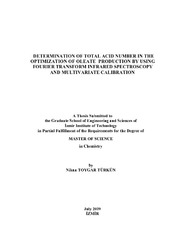Please use this identifier to cite or link to this item:
https://hdl.handle.net/11147/7368Full metadata record
| DC Field | Value | Language |
|---|---|---|
| dc.contributor.advisor | Özdemir, Durmuş | - |
| dc.contributor.author | Toygar Türkün, Nihan | - |
| dc.date.accessioned | 2019-11-18T08:45:31Z | |
| dc.date.available | 2019-11-18T08:45:31Z | |
| dc.date.issued | 2019-07 | - |
| dc.identifier.citation | Toygar Türkün, N. (2019). Determination of total acid number in the optimization of oleate production by using fourier transform infrared spectroscopy and multivariate calibration. Unpublished master's thesis, İzmir Institute of Technology, İzmir, Turkey | en_US |
| dc.identifier.uri | https://hdl.handle.net/11147/7368 | - |
| dc.description | Thesis (Master)--Izmir Institute of Technology, Chemistry, Izmir, 2019 | en_US |
| dc.description | Includes bibliographical references (leaves: 46-48) | en_US |
| dc.description | Text in English; Abstract: Turkish and English | en_US |
| dc.description.abstract | Polyethylene glycol oleate (PEG-Oleate) is a non-ionic surfactant, and is an important emulsifier for water-oil systems. It is produced by reacting oleic acid and polyethylene glycol (PEG) under vacuum for around 4 hours and at 160 °C, in the presence of acid catalyst which is para toluene sulfonic acid (PTSA). The quality and process control of this production is determination of total acid number (TAN) by the standard method ASTM D974 which is a color indicator titration. Although titration is a simple method, it is relatively time consuming and prone to human error. Besides, the solvents used in titration method, are significantly unhealthy for humans. The aim of this study is to develop fast and simple procedure for the determination of total acid number based on Fourier Transform Infrared Spectroscopy (FTIR) combined with multivariate calibration methods namely Genetic Inverse Least Squares (GILS) and Partial Least Squares (PLS). The reference total acid number of the samples collected during the esterification reaction, had been carried out by the ASTM D974 standart method and the Fourier Transform Infrared (FTIR) spectra of the same samples were also collected simultaneously with single reflection diamond Attenuated Total Reflectance (ATR) accessory. Univariate calibration was applied on a specific wavenumber corresponding to the ester peak around 1739 cm–1. Although the changes in the ester peak was showing an inrease associated to the esterification of the reactants, the results of the univariate calibration was unsucsesful. The best regression coefficient was found to be 0.997 by GILS method along with SECV and SEP as 2.295 and 2.694 mg KOH/g, respectively. The results of GILS showed that it is possible to monitor esterification process of PEG oleate. | en_US |
| dc.description.abstract | Polietilen glikol oleat ürünü su içerisinde yağ emülsiyon sistemlerinde yaygın olarak kullanılan noniyonik emülgatördür. Polietilen glikol oleat ürünü oleik asit ile polietilen glikolün 4 saat boyunca 160ºC de vakum altında esterleşme reaksiyonu sonucunda elde edilmektedir. Esterleşme reaksiyonunda para toluen sülfonik asit katalizör kullanılmaktadır. Ürünün kalite ve proses kontrolü titrasyon yöntemi ile ASTM D974 standardına uygun olarak toplam asit numarası (TAN) belirlenir. Titrasyon uygulaması kolay bir yöntem olmasına rağmen kişi kaynaklı hatalara açıktır ve uygulama sırasında insan sağlığı için zararlı solventler kullanılmaktadır. Bu tez çalışmasında, Fourier Dönüşümlü Kızılötesi Spektroskopisi (FTIR) kullanılarak geliştirilen genetik algoritmalara dayallı ters en küçük kareler (GILS) ve kısmi en küçük kareler (PLS) çok değişkenli kalibrasyon modelleri sayesinde çok daha hızlı ve kolay yeni bir toplam asit sayısı ölçme yöntemi geliştirilmesi hedeflenmiştir. Bu amaçla, polietilen glikol ve oleik asit esterleşme reaksiyonu boyunca numuneler alınmış ve alınan bu numunelerin ASTM D974 standardına göre toplam asit sayıları ölçüldü. Eş zamanlı, aynı örneklerin Fourier dönüşümlü kızılötesi (FTIR) spektrumları tek yansımalı elmas kristalli zayıflatılmış toplam yansıma (ATR) ekipmanı ile kaydedilmiştir. Ester pikinin oluştuğu dalga sayısında (1739 cm-1) tek değişkenli kalibrasyon methotlarıyla analizlenmiştir. Reaksiyon boyunca artmasına rağmen,tek değişkenli kalibrasyon methodunda toplam asit sayısı ile doğrusal olmayan bir ilişki ortaya koymuştur. GILS metodu ile oluşturulan modelin regresyon katsayı (R2) değeri 0.997 olarak belirlenirken SECV ve SEP değerleri sırasıyla 2.295 ve 2.694 (mg KOH/g) olarak hesaplanmıştır. Bu çalışma sonucunda, polietilen glikol oleat'ın esterleşme sürecinin optimizasyonunun ve takibinin FTIR spektraskopisine dayılı olarak yapılabilmesine olanak tanıyan çok daha hızlı ve kolay kemometrik yeni bir metot geliştirilmiştir. | en_US |
| dc.format.extent | x, 48 leaves | - |
| dc.language.iso | en | en_US |
| dc.publisher | Izmir Institute of Technology | en_US |
| dc.rights | info:eu-repo/semantics/openAccess | en_US |
| dc.subject | FTIR | en_US |
| dc.subject | Multivariate calibration | en_US |
| dc.subject | Partial Least Squares | en_US |
| dc.subject | Genetic Inverse Least Squares | en_US |
| dc.subject | Polyethylene glycol oleate | en_US |
| dc.subject | Chemometrics | en_US |
| dc.title | Determination of Total Acid Number in the Optimization of Oleate Production by Using Fourier Transform Infrared Spectroscopy and Multivariate Calibration | en_US |
| dc.title.alternative | Fourier Dönüşümlü Kızılötesi Spektroskopisi ve Çok Değişkenli Kalibrasyon Methodu Kullanılarak Oleate Üretiminin Optimizasyonunda Toplam Asit Sayısının Belirlenmesi | en_US |
| dc.type | Master Thesis | en_US |
| dc.institutionauthor | Toygar Türkün, Nihan | - |
| dc.department | Thesis (Master)--İzmir Institute of Technology, Chemistry | en_US |
| dc.relation.publicationcategory | Tez | en_US |
| dc.identifier.wosquality | N/A | - |
| dc.identifier.scopusquality | N/A | - |
| item.openairecristype | http://purl.org/coar/resource_type/c_18cf | - |
| item.languageiso639-1 | en | - |
| item.openairetype | Master Thesis | - |
| item.grantfulltext | open | - |
| item.fulltext | With Fulltext | - |
| item.cerifentitytype | Publications | - |
| Appears in Collections: | Master Degree / Yüksek Lisans Tezleri | |
Files in This Item:
| File | Description | Size | Format | |
|---|---|---|---|---|
| T002007.pdf | MasterThesis | 3.73 MB | Adobe PDF |  View/Open |
CORE Recommender
Page view(s)
346
checked on Mar 31, 2025
Download(s)
908
checked on Mar 31, 2025
Google ScholarTM
Check
Items in GCRIS Repository are protected by copyright, with all rights reserved, unless otherwise indicated.